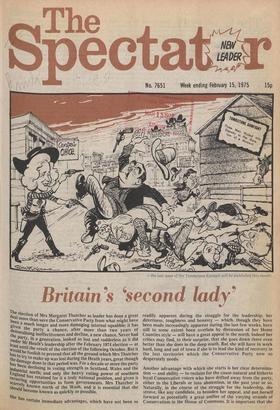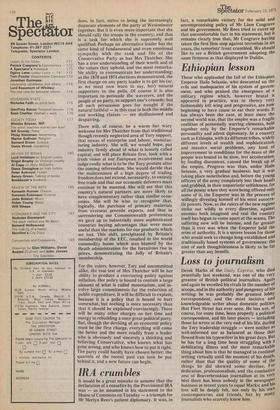Britain's 'second lady'
The election of Mrs Margaret Thatcher as leader has done a great deal more than save the Conservative Party from what might have been a much longer and more damaging internal squabble: it has ren the party a chance, after more than two years of moralising ineffectiveness and decline, a new chance. Never had e party, in a generation, looked as lost and rudderless as it did nder Mr Heath's leadership after the February 1974 election — at wleast until the result of the election of the following October. But it h ould be foolish to pretend that all the ground which Mrs Thatcher tr t° try to make up was lost during the Heath years, great though ilre damage done in that period was. For a decade or more the party i:csi been declining in voting strength in Scotland, Wales and the En ustrial north; and only the heavy voting power of southern rsecegulrarnind has retained for it a truly national position, and given it , g oPportunities to form governments. Mrs Thatcher is areelY snould be known north of the Wash, and it is essential that she She has certain immediate advantages, which have not been so readily apparent during the struggle for the leadership: her directness, toughness and honesty — which, though they have been made increasingly apparent during the last few weeks, have still to some extent been overlain by discussion of her Home Counties style — will have a great appeal in the north. Indeed her critics may find, to their surprise, that she goes down there even better than she does in the deep south. But she will have to work hard, long and out of town if she is to lead the kind of recovery in the lost territories which the Conservative Party now so desperately needs.
Another advantage with which she starts is her clear determination — and ability — to reclaim for the cause natural and hitherto loyal Conservative voters who have drifted away from the party, either to the Liberals or into abstention, in the past year or so. Naturally, in the course of the struggle for the leadership, she strove, like any candidate, to broaden her appeal, and put herself forward as potentially a great unifier of the varying strands of Conservatism in the House of Commons. It is important that she does, in fact, strive to bring the increasingly disparate elements of the party at Westminster together. But it is even more important that she should rally the troops in the country; and that is a task for which she is supremely well qualified. Perhaps no alternative leader has the same kind of fundamental and even emotional sympathy with the rank and file of the Conservative Party as has Mrs Thatcher. She has a true understanding of their worth and of the values they uphold, and the most remarkable ability to communicate her understanding: as the 1970 and 1974 elections demonstrated, the first charge on any party leader is to get his (or, as we must now learn to say, her) natural supporters to the polls. Of course it is also important to persuade the waverers, and the people of no party, to support one's crusade; but all such persuasion goes for nought if the natural faithful — in this case in both the middle and working clakses — are disillusioned and despairing.
There will, of course, be a warm but wary welcome for Mrs Thatcher from that traditional though recently neglected area of Tory support, that nexus of enterprise and labour, manufacturing industry. She will, we would hope, put industry firmly ahead of what is loosely called capital; and will place Britain first, look with a fresh vision at our European involvement and judge coolly what is to be the Tory posture after the coming referendum. She would decide that the maintenance of a high degree of trading freedom does not extend, necessarily, to entirely free trade and that our economic defences must continue to be manned. She will see that this country's natural partners are more likely to have complementary rather than similar economies. She will be wise to recognise that, logically, the purchase of primary materials from overseas precede exports, and that in surrendering our Commonwealth preferences we gave up to industrially more sophisticated countries buying advantages that were more useful than the markets for our products which we lost. This shift, precipitated by Britain's membership of the EEC, resulted in the world commodity boom which was blamed by the Heath administration for the fortuitous rise in prices, demonstrating the folly of Britain's membership.
For the voters, however, Tory and uncommitted alike, the real test of Mrs Thatcher will be her ability to produce a convincing policy against inflation. Her policy is bound to contain a large element of what is called monetarism, and in volve large commitments for the reduction of public expenditure. It will be difficult to explain, because it is a policy that is bound to hurt somewhat, but nothing is more necessary than that it should be explained convincingly. There will be many other charges on her time and energy in rebuilding a once great political party. But, though the devising of an economic policy must be the first charge, everything will come the better and the more readily from a leader who is obviously and sincerely a thinking and believing Conservative, who knows what has gone wrong, and who knows how to put it right. The party could hardly have chosen better: the quarrels of the recent past can now be put behind it, and a new future can begin.



























